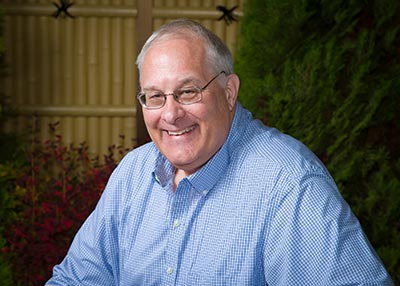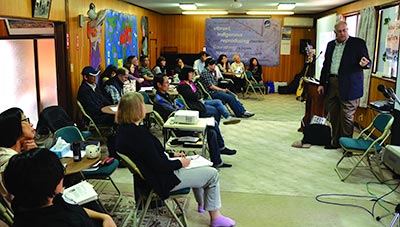Some chemical reactions are slow, John Mehn explains. However, add a catalyst like aluminum or iron to a reactant substance and watch as something more powerful happens.
One of the surprises and irresistible features of a catalyst like aluminum or iron is that the metal never gets used up, no matter how often a reaction occurs. Best of all, the chemical reaction produces something new.
Mehn’s role in global work for Converge changed after 35 years in Japan. He’s a catalyst of Converge’s Asia Impact Team. In April 2020, he transitioned into a new opportunity after decades of training church planters and making disciples in Tokyo.
Whether college chemistry or career ministry, he thinks of what a catalyst does when placed in a responsive environment. There’s a reaction between the catalyst and the surrounding reactants. Then something new, powerful and impactful appears.
On the cusp of a new adventure in ministry, Mehn is optimistic about a new direction for his passion and competency from the Lord.

“The only way to see gospel movements happen is through indigenous leadership,” Mehn said. “We can go and start stuff, but that won’t lead to a movement. Our primary task is (investing in) local leaders.”
Starting a movement centered on relationships
That primary task is why he networks with church planters from Asia, Europe and North America. To Mehn, these indigenous leaders have different needs for mentoring and support.
They could be movement leaders who’ve hit a bump in the road, he said. They might need coaching, mentoring or training to help them with ministry obstacles or personal challenges.
“We’re talking about special people who have vision and humility and giftedness that we can come alongside and help equip — so they can help equip others and equip a whole environment of leaders that can continue a movement,” he said.
Related: Starting a gospel movement among least-reached peoples is Converge’s priority.
The Asia Impact Team includes David J. as director and six others, including Mehn, as catalysts. Between these men, they have at least 120 years of experience as God’s servants in Asian contexts.
Mehn said the team comes alongside local leaders to equip them to develop gospel movements among unreached people groups. He said an early goal for the Asia Impact team is sharing a vision with local leaders so they strive to make disciples among an unreached people group.

“I love this new role I have on our impact team,” he said. “We have an incredible sense of oneness and core direction and purpose.”
Related: Converge has regional IMPACT teams to make disciples around the world.
Joining the team started with multicultural ministry
Mehn became a Christian after high school. Before that, he rejected the Christian faith of his family. Instead, he embraced drugs, alcohol, vandalism and stealing.
Nevertheless, a friend persistently and gently shared Christ with him. Eventually, he surrendered to the Lord and discovered freedom from guilt, shame and loneliness.
Christ changed Mehn so much that his parents, who were Christians, asked him what had happened. So emotional was his reaction to the Holy Spirit’s presence that his same friend believed he must have been high on drugs or alcohol.
He quickly grew in faith through Campus Crusade for Christ, now CRU, which invested in him. Then, he enrolled at Trinity Evangelical Divinity School near Chicago and earned a master’s degree in missions.
He met his wife, Elaine, at their pastor’s house while he was in seminary, and they married 43 years ago. Then, he pastored a 120-year-old church in Chicago that shared its building with a Spanish-speaking congregation.
Related: Another Chicagoland church shared their building so gospel ministry could continue.
The Mehns left for Tokyo in 1985 and helped plant churches there for the next 35 years. In 2014, a gradual plan began for Mehn’s transition back to the States and his new role. He left Japan in April 2020, right on schedule, even though his departure coincided with the unforeseen global pandemic.
Related: How is God continuing to make disciples among the Japanese?
The gospel ministry that John and Elaine learned during 35 years in Japan continues. Elaine studies the Bible through Zoom with Japanese people. John and Elaine also have mentored several couples.
Being a mentor and continuing to serve by sharing what others have taught him brings joy and life to John. Through his role on the Asia Impact Team, he gets to do even more mentoring and supporting, coaching and encouraging.
“Now I get to pay back and invest in other people what’s been invested in me all these years,” he added.
How Asian creates barriers to being, making disciples
Some of Japan’s cultural aspects apply across Asia, including in India, Pakistan, China, Taiwan and Tibet, to name a few. There are 7000-plus people groups in Asia, including more than 5600 that are unreached.
There are 2.8 billion people in Asia, stretching from Pakistan in the west to Japan in the east. Put another way, more than half of the earth’s people live on 10% of the earth’s surface, all within a 2400-mile circle centered on Kunming in southern China.
A common cultural feature for the billions in Asia, like most cultures outside the Western communities, is that Asia is group-conscious, not individualistic. In Asia, the group, the family, the clan, the kin or who they associate with define most individuals.
“That makes it difficult to be a Christian because a lot of the cultures are not Christian,” Mehn said. “So, if you’re not part of the group, you’re an oddity.”
Which explains why Asian communities can have an incredible problem with bullying, whether for adults or children. Mehn said adults bully each other by trying to conform all adults to norms and attempting to fit them into their group.
That is why suicide is so prevalent in Asian cultures, including Japan, according to Mehn.
Another cultural difference that impacts discipleship is that most Asians are very indirect. Mehn said they’re more context-oriented; they “read the air,” as they say in Japan, to avoid offending anyone and to go with the group rather than take a stand.
However, North Americans will be very assertive. Plus, many Americans are too direct and want results too quickly in an Asian setting. He said gospel servants have to be very insightful and patient. It’s vital among Asians to build trust, which takes time.
“We have to be realistic about the context we’re working in,” he added.
Related: Converge’s Office of Biblical Diversity is helping American churches consider context.
God’s catalysts for spiritual reactions are as effective as ever
Mehn said the Asia Impact Team has more than 70 contacts in 21 Asian countries. As a result, there are many relationships with crucial movement creators who can bring good news to the least-reached people in thousands of distinct cultural groups. That’s a good start in an eternal mission where so many don’t know Christ.
“Half of our world still hasn’t heard about Jesus,” Mehn said of those who live in Asian countries from Pakistan to Japan and China to India.
That truth, David J. explained, is at the core of Mehn’s life and ministry. He met the Mehns in 1987 in Japan.
Ever since, David J. has seen John Mehn strive to move things forward for starting churches among least-reached peoples. Yet, the Mehns have encountered many challenges to God’s power, love and priority.
“John did not give up,” David J said. “He kept moving things forward. He did what God asked him to do, and he used other skill sets. He moved forward the concept that we must plant churches.”
Throughout Converge’s churches, Mehn said God’s people can pray for and learn about unreached peoples. In addition, individual churches can adopt people groups, all so that least-reached peoples know Christ as Savior.
Related: How your church can discover the unique ways God has prepared it to make a global impact
Thus, Mehn’s willing and thankful to continue serving the Lord as a catalyst for the spiritual leaders who can stir a movement for the gospel. Like aluminum in contact with a reactant, Mehn is confident God can create something powerful as he catalyzes relationships with significant Asian leaders.
“Jesus asked us to make disciples of all nations,” he said. “That’s what we’re called to do, and that’s what we’re going to try to do.”
Converge is asking God for a gospel movement among every least-reached people group – in our generation. Learn how we are playing a role in accomplishing the Great Commission and how you can be involved.